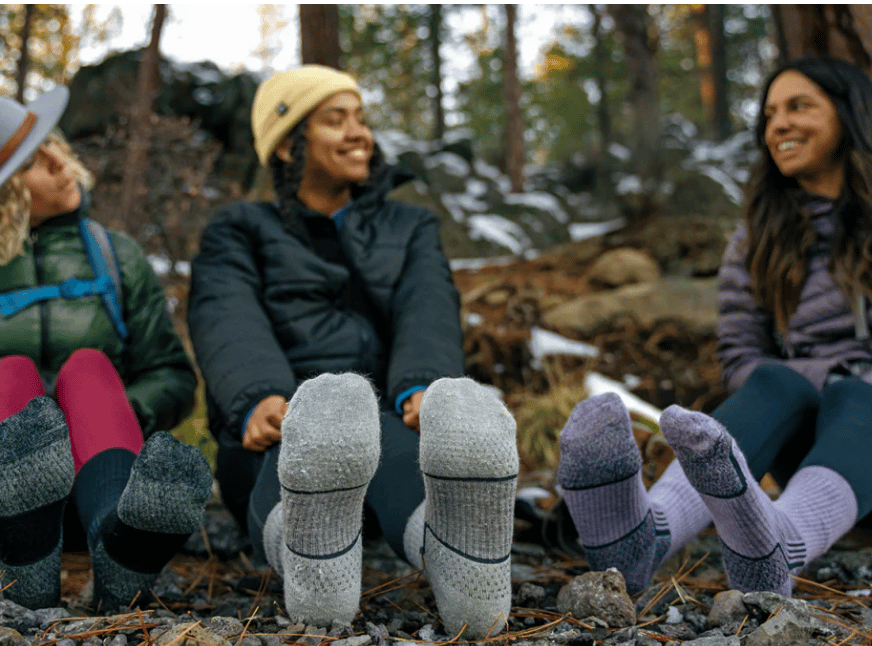Podcasting and the WNBA have both experienced meteoric rises in popularity and struggled with how to balance commercial success with integrity and sustainability. The WNBA is in the midst of CBA negotiations, as the WNBPA rejected the initial proposals from the league in favor of demanding the respect and compensation its athletes deserve. The intersection of these worlds—particularly as WNBA players launch their own podcasts—creates a fascinating lens through which to examine media value, player safety, and the maturation of the most competitive league in the world for women’s basketball. From viral moments to valuable movements, these WNBA players deserve their flowers AND their funds. In this article, I’m sharing my thoughts on players, podcasts, and the price of popularity in women's basketball. Let me know when you reach the poll at the end! 🥂
But first, a word from our supporter…

Elevate your outdoor adventures with ToughCutie socks - where durability meets style for women who never back down from a challenge. These premium performance socks are engineered with moisture-wicking technology and reinforced cushioning to keep you comfortable whether you're crushing miles on the trail or scaling new heights. Use our affiliate link to get 15% off your order and give your feet the support they deserve (code: MELANINMVP).
On the Colin and Samir Show, the Spotify CEO said he made the 8-figure deal with the Joe Rogan Podcast to inject energy into the podcast space. What he also did was signal that podcasts are a commodity to be bought and sold, leveraged for lead acquisition, and mined for ad dollars. Podcasts are an audio medium designed for connection, education, entertainment, and storytelling. Podcasts are not products to be manipulated solely for financial gain. Yes, we’d all like to make a living from our podcasts, but there comes a time when we have to decide that advertising and money shouldn’t dictate editorial decisions. With the seemingly endless round of podcast layoffs, and podcast listenership largely leaning toward larger names with larger teams (who aren’t necessarily producing better shows than indie podcasters), it is evident that this system is unsustainable for the industry and does not promote creativity or innovation within the space. Legacy media, journalists, and creators are struggling to maintain their integrity and credibility at the expense of losing money.
The WNBA is falling victim to the same shiny object. When women's college basketball players in 2023 and 2024 became viral sensations, attention shifted to the WNBA as people wanted to follow their careers and rivalries. The WNBA started viewing players as commodities to be leveraged for ad dollars, league expansion investments, and ticket sales rather than athletes who deserved to be protected and respected. Why are they allowing toxic narratives and harmful behavior to threaten the safety of players? For the prospect of more money? It is unsustainable for the league. Why are they trying to stifle Unrivaled and Athletes Unlimited? They are proof that the leaders make other great leaders.
Podcasting is in its teenage years. Acne (inconsistent monetization models that haven't fully stabilized), growth spurts, and being too young to drive with people in the car (aka no union). But the industry will continue to mature and find its way forward, just as the WNBA did in its early years.
Now, the WNBA is in her 30s. Her soft girl era. Setting boundaries. Looking to settle down and have some stability. The energy of her 20s, but the urgency of someone who wants benefits and PTO to be the norm. Enough work experience to warrant calling something a career and expecting her salary to match.
It's worth looking at the NWSL's recent CBA success as a blueprint. The National Women's Soccer League secured unprecedented gains in its collective bargaining agreement, including significant salary increases, free agency rights, and mental health resources. This milestone wasn't just about compensation—it was about players gaining control over their narrative and future. Similarly, the WNBA stands at a crossroads where players can leverage their growing popularity to create their own media empires. We're already seeing this with projects like Offseason FC, the unscripted TV series created by Midge Purce and backed by Alexis Ohanian, which offers an intimate look at players' lives beyond the field. WNBA athletes have the perfect opportunity to follow suit, creating content that not only grows their personal brands but expands the league's reach organically. I wouldn’t even mind if we just got a higher production version of the Studbudz (since Syd and TP left us high and dry for season 2 and gave us this podcast instead). The league that supports this player-driven content creation, rather than attempting to control it, and player safety will ultimately benefit from the authentic engagement and expanded audience these efforts bring.
Do you think women basketball players starting a podcast makes them better or worse as players?
This video has me curious to hear your thoughts.
Thank you for reading! 💌
If you enjoyed this article, consider sharing it with another women’s sports fan or everyday athlete who might enjoy it! If you’re new here and want to catch up on previous articles, you might like these:
